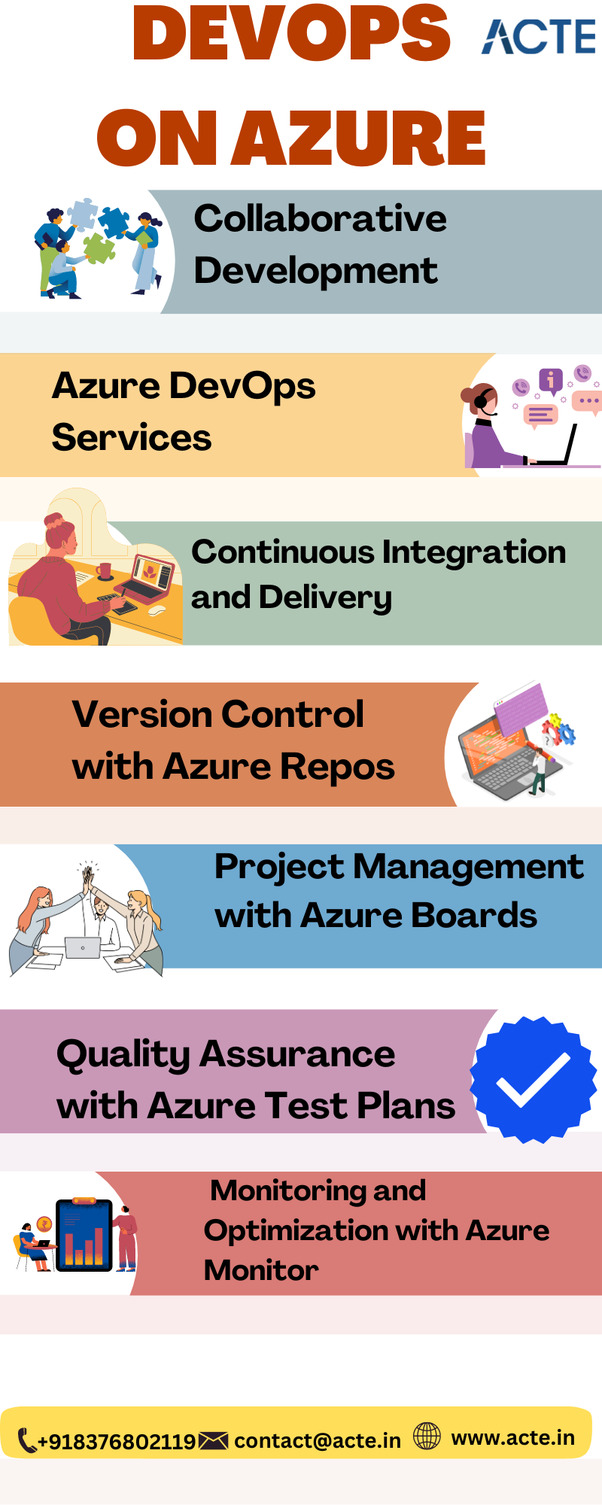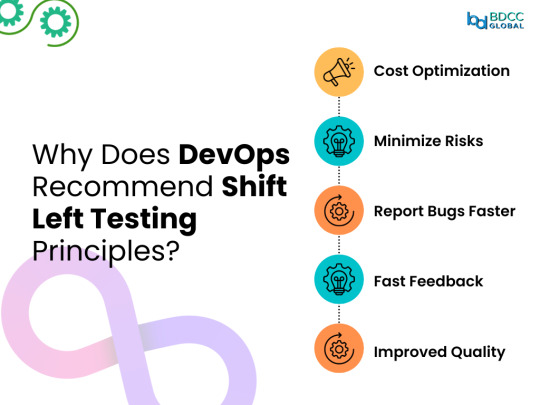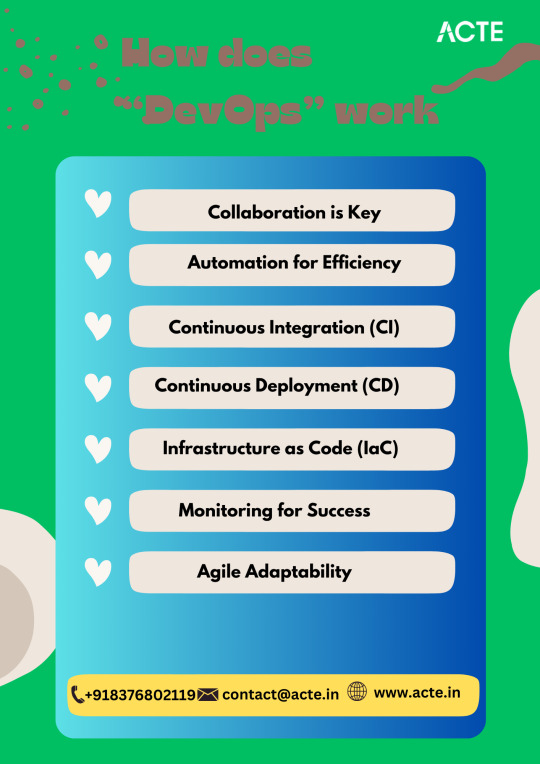#devops principles
Explore tagged Tumblr posts
Text
Why Does DevOps Recommend Shift-Left Testing Principles?
In the fast-paced world of software development, delivering high-quality products quickly is the ultimate game. However, with the need for speedy delivery comes the risk of defects slipping through the cracks, which can be costly and time-consuming to fix later. This is where DevOps shift-left testing principles come into play.
By moving testing earlier in the development process, DevOps shift-left testing helps teams identify and resolve issues sooner, leading to faster releases and better overall product quality.
Read More: Why Does DevOps Recommend Shift-Left Testing Principles?
0 notes
Text
What is DevOps?
DevOps is a partnership between IT Operations and Development that enables automated and repeatable software development and deployment. The firm can provide software applications and services more quickly thanks to DevOps. The words “Development” and “Operations” are combined to make the full term “DevOps.”
1 note
·
View note
Text
Unlocking the Power of DevOps on Azure: A Comprehensive Guide
In today's rapidly evolving technological landscape, the adoption of DevOps practices has become imperative for organizations striving to deliver high-quality software at a faster pace. Microsoft Azure, with its robust suite of cloud services, provides an ideal platform for implementing and maximizing the benefits of DevOps. This comprehensive guide will walk you through the key components, best practices, and tools available on Azure to unlock the full potential of DevOps.
Azure Overview
Azure is Microsoft's cloud computing platform, providing a wide range of services to help organizations build, deploy, and manage applications. When combined with DevOps practices, Azure becomes a powerful tool for achieving continuous integration and continuous delivery (CI/CD)."In the world of continuous improvement, DevOps training in Hyderabad is the compass that guides your team towards efficiency and innovation."

Integration with DevOps
Azure seamlessly integrates with popular DevOps tools and services, creating a robust ecosystem for application development. This integration ensures that development teams can leverage Azure's capabilities to streamline processes, automate tasks, and deliver software faster and more reliably.
Understanding DevOps on Azure
DevOps on Azure is a collaborative and streamlined approach to software development and IT operations, leveraging Microsoft's cloud computing platform, Azure. It combines the principles of DevOps with the robust features of Azure to enhance the entire development lifecycle.
1. Collaborative Development:
DevOps on Azure promotes collaboration between development and operations teams. It breaks down silos, fostering a culture where both teams work together seamlessly to achieve common goals.
2. Azure DevOps Services:
Azure offers a suite of tools known as Azure DevOps Services, covering version control, build automation, release management, and more. These services act as a central hub, providing a unified platform for efficient project planning, tracking, and execution.
3. Continuous Integration and Delivery (CI/CD):
Azure Pipelines, a key component, automates the build, test, and deployment processes, enabling teams to achieve continuous integration and continuous delivery. This results in faster and more reliable software releases.
4. Version Control with Azure Repos:
Azure Repos, integrated with Azure DevOps, provides robust version control supporting Git and TFVC. It ensures effective source code management and collaboration, crucial for a smooth development workflow.
5. Project Management with Azure Boards:
Azure Boards facilitates agile project management, allowing teams to plan sprints, track work progress, and manage backlogs. This ensures visibility and transparency throughout the development cycle.
"Break free from limitations. Our DevOps online course empowers you to upscale your skills, all from the comfort of your home."

6. Quality Assurance with Azure Test Plans:
DevOps on Azure includes Azure Test Plans, a testing tool that assists teams in planning, tracking, and managing testing efforts. This ensures the quality and reliability of applications before deployment.
7. Monitoring and Optimization with Azure Monitor:
Azure Monitor provides comprehensive insights into the performance and health of applications and infrastructure. This monitoring solution allows proactive identification and resolution of issues, contributing to a more stable and reliable system.
Summarize the key takeaways from the guide, emphasizing the seamless integration of DevOps practices on Microsoft Azure. Encourage organizations to leverage the powerful combination of Azure's cloud services and DevOps principles to enhance agility, collaboration, and overall software delivery capabilities.
0 notes
Text
Unlock organizational success by harmonizing DataOps & DevOps—propel towards efficiency & innovation in a data-driven landscape.
#Software Development Consulting Company#Software Development Solutions Provider#DevOps Services Providers#DataOps vs DevOps#DevOps Methodology#DevOps Principles#DevOps and DataOps Integration#Digital Strategies
0 notes
Text
Unlock organizational success by harmonizing DataOps & DevOps—propel towards efficiency & innovation in a data-driven landscape.
#Software Development Consulting Company#Software Development Solutions Provider#DevOps Services Providers#DataOps vs DevOps#DevOps Methodology#DevOps Principles#DevOps and DataOps Integration#Digital Strategies
0 notes
Text
DataOps vs. DevOps: A Comparative Strategy Analysis - Powershow
Discover the power of merging DataOps & DevOps! Unlock efficiency and drive success through seamless collaboration. Dive into synergy-driven triumph today.
#Software Development Consulting Company#Software Development Solutions Provider#DevOps Services Providers#DataOps vs DevOps#DevOps Methodology#DevOps Principles#DevOps and DataOps Integration#Digital Strategies
0 notes
Text
Unlock the potential of legacy systems with DevOps. Seamlessly integrate DevOps practices for a smoother, more efficient journey.
#Software Development And Delivery#Integration Of DevOps Practices#Reviving Legacy With DevOps#DevOps In A Legacy System#Principles Of DevOps#DevOps Principles
0 notes
Text
Unlock the potential of legacy systems with DevOps. Seamlessly integrate DevOps practices for a smoother, more efficient journey.
#Software Development And Delivery#Integration Of DevOps Practices#Reviving Legacy With DevOps#DevOps In A Legacy System#Principles Of DevOps#DevOps Principles
0 notes
Text
Unlock the potential of legacy systems with DevOps. Seamlessly integrate DevOps practices for a smoother, more efficient journey.
#Software Development And Delivery#Integration Of DevOps Practices#Reviving Legacy With DevOps#DevOps In A Legacy System#Principles Of DevOps#DevOps Principles
0 notes
Text
12-Factor App Methodology: Essential Web Development Best Practices for Modern Apps
Explore the 12-Factor App Methodology and uncover web development best practices that enhance scalability and maintainability. This comprehensive guide delves into 12-Factor App Principles, offering insights into effective software development methodologies and their impact on cloud-native applications.
#12-Factor App Methodology#Web Development Best Practices#12-Factor App Principles#Software Development Methodologies#Cloud-Native Applications#DevOps Practices
0 notes
Text

🔍 Shifting Left with DevOps: Discover why embracing early testing principles is a game-changer. Uncover the power of proactive quality assurance! 🚀🛠️
1 note
·
View note
Text
Introduction to SkillonIT Learning Hub- Empowering Rural Talent With World-Class IT Skills
SkillonIT provides IN-Demand IT courses, connecting Rural talent with rewarding IT skills through affordable, accessible and career-focused education. with Guaranteed pathways to internship and high paying jobs, start with us and step into Opportunities at top Tech-leading Companies. Skillonit Learning Hub, located in Buldhana, Maharashtra, is a leading institute dedicated to equipping individuals with cutting-edge technology skills. With a mission to bridge the digital divide, the institute provides high-quality education in various IT and professional development domains. Skillonit focuses on practical, industry-oriented training, ensuring students gain the expertise needed to thrive in today’s competitive job market. The hub is committed to empowering rural talent and shaping the next generation of skilled professionals.

Courses Offered Skillonit Learning Hub offers a diverse range of courses tailored to industry demands, enabling students to master both technical and professional skills.
Blockchain Development — Smart Contracts (Solidity, Rust, Web3.js, Hardhat) — Blockchain Protocols (Ethereum, Solana, Binance Smart Chain, Fantom) — Decentralized Applications (DApps) Development
Front-End Development — HTML, CSS, JavaScript — Frameworks: React.js, Vue.js, Angular — Responsive Web Design & UI Frameworks (Bootstrap, Tailwind CSS)
Back-End Development — Server-side Programming (Node.js, Python, PHP, Java, .NET) — Database Management (MySQL, MongoDB, Firebase, PostgreSQL) — API Development (RESTful APIs, GraphQL, WebSockets)
Full-Stack Development — Front-End + Back-End Integration — MERN Stack Development — Database, Deployment & DevOps Practice
Mobile App Development — Cross-Platform Development (Flutter, React Native)
Unity 3D Game Development — Game Mechanics & Physics — C# Programming for Game Development — Virtual Reality (VR) & Augmented Reality (AR) Integration
Professional UI/UX Design — User Interface Design (Adobe XD, Figma, Sketch) — User Experience Principles — Prototyping, Wireframing & Usability Testing
Professional Graphic Design — Adobe Photoshop, Illustrator, and CorelDraw — Branding & Logo Design — Digital Art & Visual Communication
Digital Marketing — SEO, SEM, and Social Media Marketing — Content Marketing & Copywriting — Google Ads, Facebook Ads & Analytics
Spoken English — Communication Skills & Public Speaking — Accent Training & Fluency Improvement
Personality Development — Business & Corporate Etiquette — Confidence Building & Interview Preparation — Leadership & Teamwork Skills
Location & Contact : Address : Chhatrapati Tower, Above Maratha Mahila Urban, 3rd Floor, Chikhali Road, Buldhana, Maharashtra, 443001.
Contact us
Conclusion : Skillonit Learning Hub is revolutionizing IT and professional education by making technology and essential career skills accessible to aspiring developers, designers, marketers, and professionals. With a strong emphasis on practical learning, industry exposure, and career opportunities, it stands as a beacon of growth for young talent in Buldhana and beyond. Whether you are looking to build a career in tech, marketing, design, or personal development, Skillonit provides the ideal platform to achieve your goals. Join Our Social Community
Skillonit #Education #ITCourses #Buldhana #Maharashtra #IT #Blockchain #Fullstack #Front-end #Back-end #MobileApp #Unity3d #UIUX #Graphicdesign #Digitalmarketing #SpokenEnglish #Personality #development
2 notes
·
View notes
Text
Unveiling the Inner Workings of DevOps
DevOps, short for Development and Operations, is a revolutionary approach that has reshaped the landscape of software development and IT operations. In this blog post, we will delve into the core concepts, principles, and practices that constitute the inner workings of DevOps. By understanding the essence of DevOps, organizations can foster collaboration, streamline workflows, and accelerate the delivery of high-quality software.
"DevOps training in Hyderabad: Transforming silos into bridges for enhanced communication and collaboration."

How Does DevOps Work?
DevOps is like the conductor of an orchestra, ensuring all the different elements in software development play together harmoniously. Let's break down how it works:
1. Collaboration is Key
DevOps works by fostering a collaborative culture between development and operations teams. The traditional barriers are dismantled, promoting seamless communication, and shared responsibilities.
Example: Imagine developers and operations teams as two puzzle pieces. DevOps brings them together, creating a complete picture.
2. Automation for Efficiency
DevOps leverages automation to handle repetitive tasks in the software development lifecycle. This includes testing, deployment, and integration, reducing manual effort and enhancing efficiency.
Example: Think of automated tests as your spell-checker. It catches errors before they reach the final document (your application).
3. Continuous Integration (CI)
Through CI, DevOps ensures frequent integration of code changes into a shared repository. This practice allows for the early detection of issues, enabling teams to work cohesively.
"The power of DevOps at your fingertips: Our DevOps online course brings industry expertise to your screen, making mastery just a click away."
Example: CI is like making updates to a shared Google Doc. Everyone sees changes in real time, avoiding conflicting versions.
4. Continuous Deployment (CD)
Building on CI, DevOps incorporates CD, automating the release process. This facilitates a continuous and reliable flow of updates, making deployments smoother and more predictable.
Example: CD is akin to a chef serving a dish immediately after preparing it, ensuring continuous updates.

5. Infrastructure as Code (IaC)
DevOps treats infrastructure as code, managing servers, networks, and databases through code. This approach ensures consistency, scalability, and easy replication of environments.
Example: Treating your infrastructure as code is like having a recipe for your server setup—easy to replicate, consistent every time.
6. Monitoring for Success
DevOps emphasizes continuous monitoring of application performance. This ongoing feedback loop helps teams identify and address issues promptly, contributing to continuous improvement.
Example: Monitoring is like having a fitness tracker for your application. It alerts you when things are off, ensuring optimal health.
7. Agile Adaptability
Aligned with Agile principles, DevOps embraces change and flexibility in software development. The iterative nature of Agile methodologies ensures adaptability to evolving requirements.
Example: DevOps embraces change like a GPS recalculating your route. It ensures you reach your destination despite unexpected detours.
DevOps is a transformative approach that goes beyond tools and technologies, emphasizing collaboration, automation, and continuous improvement. By adopting DevOps principles and practices, organizations can enhance their ability to deliver high-quality software at a faster pace, ultimately meeting the demands of today's dynamic and competitive business landscape. As we continue to unveil the inner workings of DevOps, it becomes clear that it is not just a methodology; it's a culture that empowers teams to innovate and thrive in the ever-evolving world of technology.
0 notes
Text
Unlocking success: Merge DataOps & DevOps for unparalleled efficiency & innovation in a data-driven world. Optimize processes now!
#Software Development Consulting Company#Software Development Solutions Provider#DevOps Services Providers#DataOps vs DevOps#DevOps Methodology#DevOps Principles#DevOps and DataOps Integration#Digital Strategies
0 notes
Text
Unlocking success: Merge DataOps & DevOps for unparalleled efficiency & innovation in a data-driven world. Optimize processes now!
#Software Development Consulting Company#Software Development Solutions Provider#DevOps Services Providers#DataOps vs DevOps#DevOps Methodology#DevOps Principles#DevOps and DataOps Integration#Digital Strategies
0 notes
Text
DataOps vs. DevOps: A Comparative Strategy Analysis - EDocr
Discover the power of merging DataOps & DevOps! Unlock efficiency and drive success through seamless collaboration. Dive into synergy-driven triumph today.
#Software Development Consulting Company#Software Development Solutions Provider#DevOps Services Providers#DataOps vs DevOps#DevOps Methodology#DevOps Principles#DevOps and DataOps Integration#Digital Strategies
0 notes